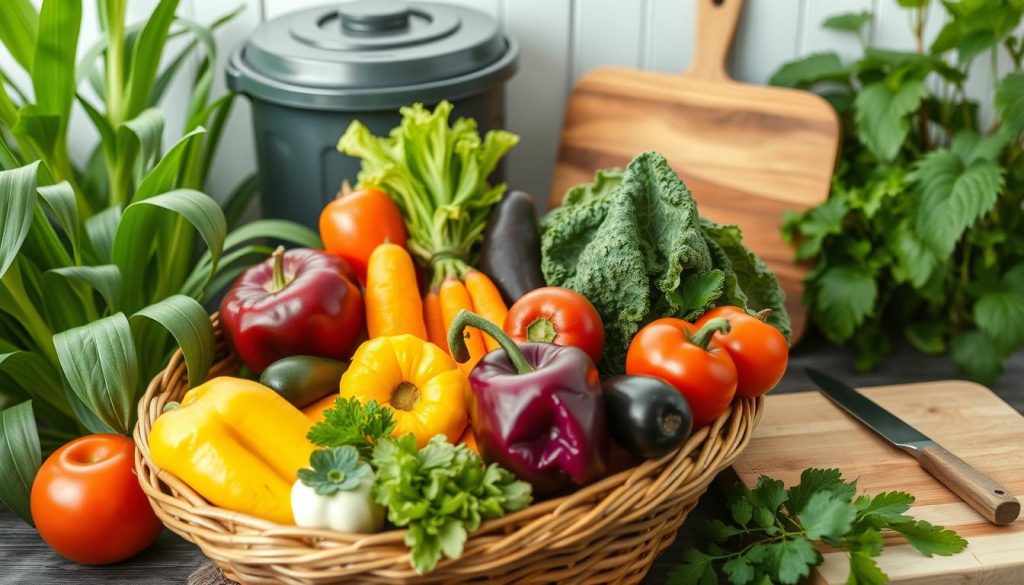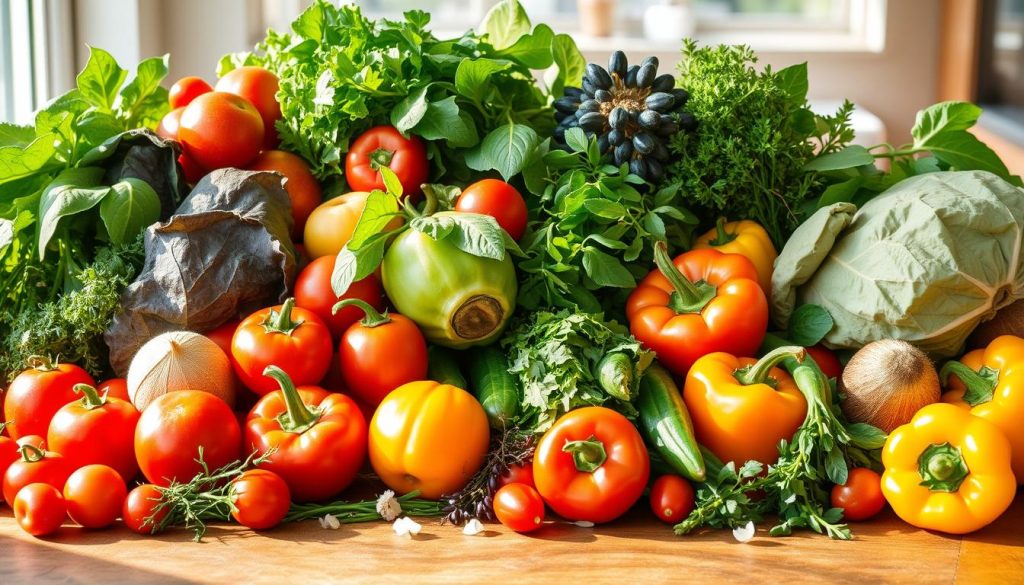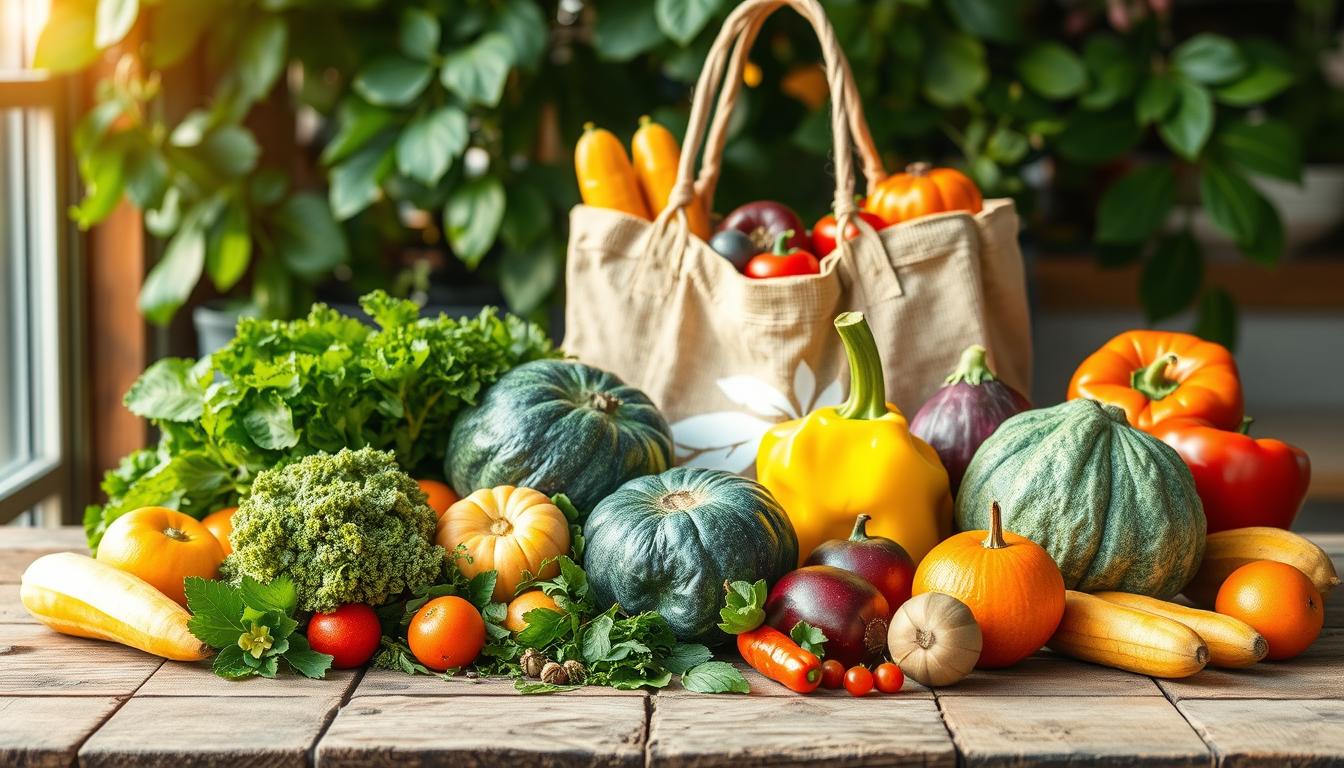Welcome! If you’re looking for a balanced lifestyle, you’ve probably heard about the perks of healthy, sustainable diets. This guide will explain what it means to adopt a holistic nutrition approach. It shows how it can enhance your well-being.
By making small, thoughtful choices, we can improve our health and help the environment. Let’s start this journey together toward a better life.
Understanding Healthy, Sustainable Diets
A healthy, sustainable diet is more than just eating right. It’s about living in a way that’s good for us and the planet. Eating nutritious meals and practicing mindful eating are key to finding this balance.
What Does a Healthy Diet Mean for Me?
To me, a healthy diet means eating a variety of foods that my body needs. I focus on meal plans that boost my health and energy. Mindful eating helps me listen to my body, making better food choices and avoiding too much food.
Sustainability and Its Importance in Nutrition
Healthy eating also means being kind to our planet. Choosing foods that are gentle on the environment, like plants, helps us use resources wisely. Supporting local farmers is another way to make our food choices sustainable. This way, my diet supports the health of our planet.
The Benefits of Embracing Sustainable Eating

Choosing sustainable eating has many benefits. It’s good for our health, the environment, and local businesses. By eating eco-friendly and using local ingredients, we make a positive difference.
How It Affects My Health
Eating sustainably boosts my health. I get fresh, nutrient-rich food without harmful additives. This keeps my body healthy and strong.
The Environmental Impact of Food Choices
My food choices affect the planet. Buying local reduces carbon emissions from long-distance transport. It fights climate change and keeps our planet healthy. Sustainable eating also cuts down on waste and promotes smart consumption.
Supporting Local Economies
Choosing sustainable food helps local businesses thrive. Buying local supports farmers and creates jobs. It grows the economy and strengthens our food system. This builds community and encourages others to eat sustainably.
Key Components of a Healthy, Sustainable Diet

A healthy, sustainable diet is key to a better life. Let’s explore the essential parts of such a diet.
Whole Foods vs. Processed Foods
Choosing whole foods over processed ones is crucial. Whole foods like fruits, vegetables, and nuts are full of nutrients. On the other hand, processed foods often have additives and preservatives. Opting for organic foods is better as they are grown without harmful chemicals.
Including more whole foods in my diet greatly improves my health. Whether I shop at local farmers’ markets or choose organic at the supermarket, every choice matters.
Plant-Based Eating: A Path to Wellness
Embracing plant-based diet options is vital for a sustainable diet. Eating more plant-based meals can lower disease risks and help with weight management. Plus, it’s better for the environment than meat-based diets.
There are many nutritious plant-based options, from salads to lentils and chickpeas. Trying out new plant-based recipes adds variety and supports sustainable living.
Incorporating Seasonal Produce in My Meals
Using seasonal produce in my meals is sustainable and supports local farmers. Seasonal fruits and veggies are fresher and more nutritious. Choosing local, organic options improves my diet and connects me to my community’s agricultural cycles.
Here’s a quick look at some common seasonal produce throughout the year:
| Season | Produce |
|---|---|
| Spring | Asparagus, Strawberries, Spinach |
| Summer | Tomatoes, Zucchini, Peaches |
| Fall | Pumpkins, Apples, Brussels Sprouts |
| Winter | Carrots, Kale, Citrus Fruits |
By focusing on seasonal and organic foods, I nourish my body and support a sustainable lifestyle.
Practical Tips for Transitioning to a Sustainable Diet

Switching to a sustainable diet can be easier with the right strategies. Here are some tips to help you live a balanced life and eat mindfully.
Meal Planning for Success
Good meal planning is key for a healthy lifestyle. By planning meals ahead, I keep my diet nutritious and satisfying. This way, I avoid unhealthy choices.
Using a detailed meal plan helps me save time. It lets me focus on eating foods that are good for me and in season.
- Start by selecting recipes that incorporate a variety of whole foods.
- Plan meals around seasonal produce for maximum flavor and sustainability.
- Prep ingredients ahead of time to streamline the cooking process.
Mindful Grocery Shopping
Mindful grocery shopping means making choices that are good for the planet. I buy local produce and choose organic when I can. This helps me live a balanced life and cuts down on food waste.
- Build a shopping list based on your meal plan to avoid unnecessary purchases.
- Choose fresh, organic produce and consider the environmental impact of your selections.
- Support local farmers’ markets for fresher and more sustainable options.
Cooking Techniques That Preserve Nutrients
Choosing the right cooking methods is important for keeping nutrients in my food. By using techniques that preserve nutrients, I support my mindful eating habits.
| Technique | Benefits |
|---|---|
| Steaming | Preserves vitamins and minerals |
| Grilling | Enhances flavor without added fats |
| Sautéing | Maintains the texture and nutrients of vegetables |
| Blanching | Quickly cooks vegetables while retaining nutrients |
Using these tips can make switching to a sustainable diet easier. It helps you live a balanced life and eat mindfully.
Overcoming Challenges in Sustainable Eating
Starting a sustainable diet might seem hard, but it’s doable with the right tips. You can manage your budget, eat out healthily, and stay motivated. By focusing on nutrition and using smart budgeting, you can make sustainable eating easy and affordable.
Budget-Friendly Strategies
Many worry about the cost of sustainable eating. But, there are ways to make it budget-friendly. Buying whole grains and legumes in bulk saves money. Shopping at local farmers’ markets supports local farmers and gets you fresh produce at good prices.
Choosing seasonal fruits and veggies is also smart. They’re often cheaper and support local farmers. This way, you can eat well without spending too much.
Eating Out and Staying on Track
Eating out can be tricky when you’re trying to eat sustainably. But, it’s not impossible. Look for restaurants that use local and organic ingredients. Many places now share where their food comes from.
Opt for dishes with seasonal and plant-based foods. This helps you stick to your goals. Also, eating mindfully and controlling portions can help your wallet and health.
Staying Motivated on My Healthy Journey
Keeping up the motivation is crucial for a sustainable diet. Set small, achievable goals to stay focused and feel accomplished. Keeping a food diary or using an app can help you track your progress.
Being part of a supportive community is also key. Use social media or local groups for encouragement and new ideas. Remember, sustainable eating is about more than food. It’s about building a healthy relationship with food and yourself.
